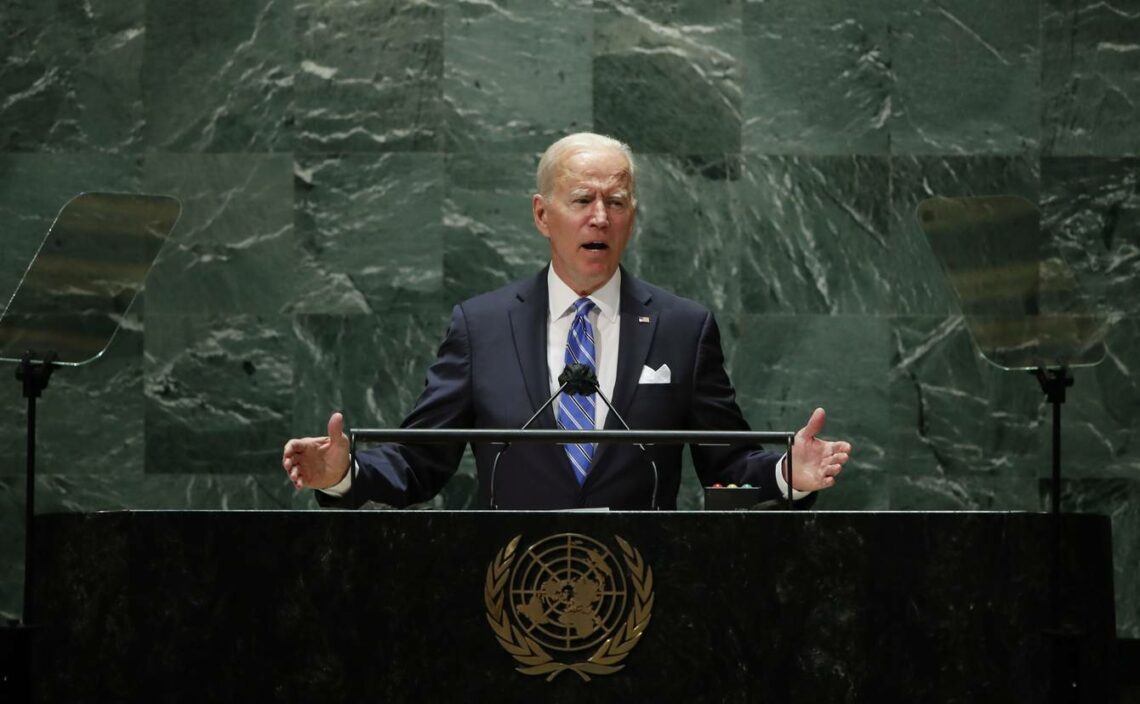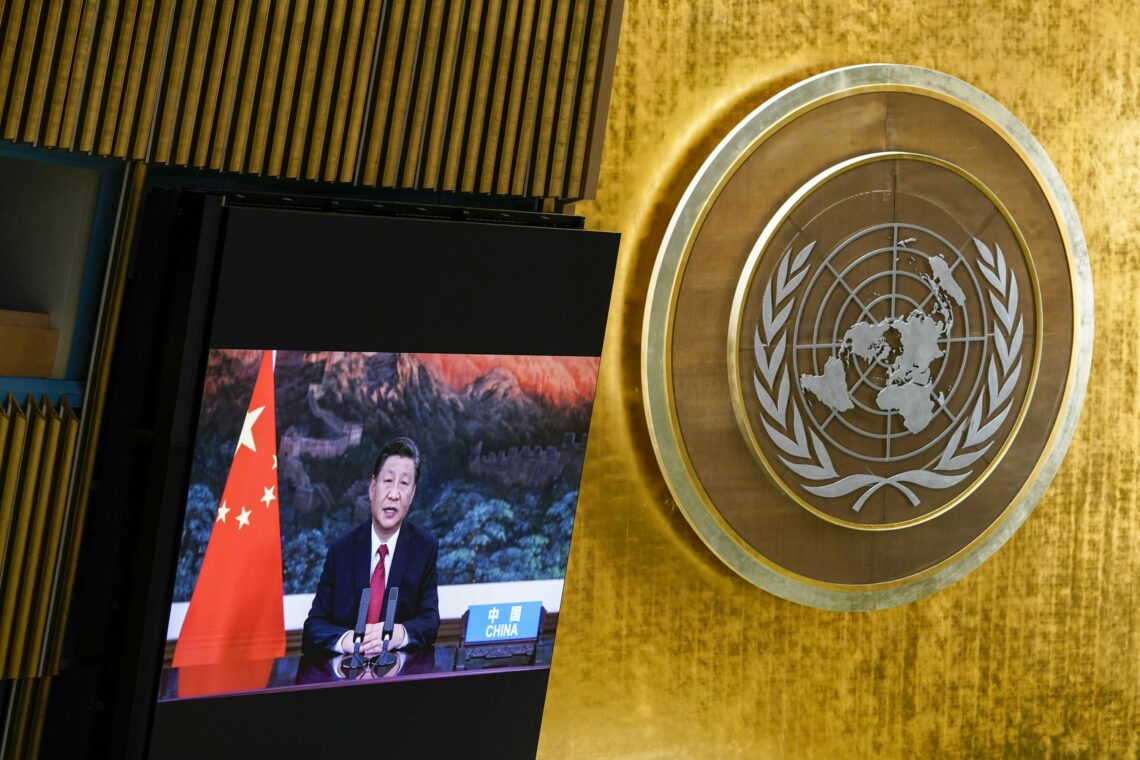Biden and Xi signal a new, less combative approach
Joe Biden and Xi Jinping are seeking a more constructive way forward for their countries’ relation. The focus on competition rather than conflict means that both are also trying to improve their global image. That’s good news for the world.

In a nutshell
- Biden is stressing competition rather than conflict with China
- Both the U.S. and China are concerned about their global image
- Tensions could dissipate, but the rivalry will last for decades
The leaders of the United States and China, Joe Biden and Xi Jinping, both spoke at the United Nations General Assembly in New York on September 21, 2021. The two major powers have had especially tense relations for several years now, and countries around the world are particularly attuned to the signals they send about their foreign policies. As it was President Biden’s first appearance at the UN since taking office, his speech was of particular interest.
Neither leader mentioned the other’s country in their speeches, and President Biden also avoided references to the Chinese Communist Party. His only direct allusion to China was a single mention of Xinjiang in the context of human rights violations. This restraint was a much-needed act of diplomacy, demonstrating President Biden’s intention to seek peaceful solutions to Washington’s differences with Beijing. The gesture was also a response to statements made by UN Secretary-General Antonio Guterres, who in an interview prior to the assembly expressed worry that relations between China and the United States were “completely dysfunctional” and called on both sides to avoid a “new cold war.” The White House disagreed with this characterization, saying that the U.S. relationship with China is “not one with conflict but competition.”
Comprehensive challenge
The emphasis on competition while also affirming a peaceful approach to resolving differences was a key point in President Biden’s speech and has set the tone for the White House’s China policy since he took office. The strategy reveals that the U.S. is indeed worried that its rival will surpass it in certain key areas. That tacit acknowledgment has also enhanced China’s global position. President Biden understands China’s challenge to the U.S. amounts to a long-term, comprehensive authoritarian threat to the entire democratic system: it will last at least 10 to 20 years and manifest itself in many fields, including economics, technology, defense, ideology, culture and society.
Contemporary democracies have come under threat.
Because President Biden understands that this competition will determine not only the course of U.S.-China relations but also the future of democracy, he said, “we’re opening a new era of relentless diplomacy … of renewing and defending democracy.” He used the phrase “new era” a second time to describe how the world had entered a period in which it must decide whether rapidly evolving technologies will become “a force to empower people or to deepen repression.” The subtext here is that contemporary democracies have come under threat and that the U.S., as the world’s leading democracy, must take seriously the issue of authoritarianism, primarily from China.
That challenge is daunting because the CCP has mastered using modern technologies to repress its own people. Its comprehensive surveillance systems are far beyond what the Soviets had during the Cold War. Over the past few years, the Chinese political elite, driven by the perception of a “rising East and declining West” have been promoting a model of “digital authoritarianism” through channels like the Belt and Road Initiative.
Overall, President Biden’s speech set a nonconfrontational foundation from which the U.S.-China rivalry can move forward. “All the major powers of the world have a duty, in my view, to carefully manage their relationships so they do not tip from responsible competition to conflict,” he said. The question is whether President Biden’s counterpart will do what the U.S. wants or expects. What Washington calls “responsible competition” is competition with rules that apply to both sides. But that is not necessarily how China wants to play.

Xi Jinping’s speech at the UN conference did not mention competition, let alone any rules. Recently, he has even denied that China is competing against the U.S. at all. This is typical for the CCP, which often acts without talking about what it is doing, or says one thing while doing another.
A new era
President Biden’s “new era” is showing itself in many ways. On the political front, not only do contemporary democracies need to defend their institutions, but they need to “renew” themselves, as he put it. Mutual trust among Western democracies is crucial, and on this front President Biden has put in a lot of work. His “America is back” mantra seems to be regaining some of the trust and reestablishing the communication that was lost under the Trump administration. However, the friction between the U.S. and the European Union – and especially France – caused by the withdrawal of troops from Afghanistan and the recent AUKUS deal, shows Washington needs to improve its diplomacy.
Economic trends also reflect the new era. The full-scale globalization – call it “globalization 1.0” – that followed the collapse of the Soviet Union has reached its end. Now, the world needs a framework for “globalization 2.0”: the World Trade Organization needs reform, a new system for multilateral trade needs to be built, and intellectual property needs to be better protected.
The world needs a framework for globalization 2.0.
“We will pursue new rules of global trade and economic growth that strive to level the playing field so that it’s not artificially tipped in favor of any one country at the expense of others and every nation has a right and the opportunity to compete fairly,” said President Biden. Unfortunately, he has been slow to act in this regard. China, on the other hand, has moved a step ahead by applying for membership in the Comprehensive and Progressive Agreement for Trans-Pacific Partnership (CPTPP). If the U.S. does not produce a plan for a new global trade framework soon, the gains President Biden has made in other areas could be undone.
Universal values
“[T]he United States will champion the democratic values that go to the very heart of who we are as a nation and a people: freedom, equality, opportunity, and a belief in the universal rights of all people,” according to President Biden. In his speeches, he usually tries to explain how universal values underpin his policies. Respect for universal values is an important feature of all democracies. Interestingly, under previous leaders, the CCP took a positive view of universal values. But under Xi Jinping, it regards them as a tool of the West to oppress other countries, especially China.
Still, at the UN, President Xi felt compelled to express support for a rules-based system. “In the world, there is only one international system – the international system with the United Nations at its core. There is only one international order – the international order underpinned by international law. And there is only one set of rules – the basic norms governing international relations underpinned by the purposes and principles of the U.N. Charter,” he said.
For President Xi, there are no values that underpin the global order.
President Xi recognizes the rules of the UN, but not that universal values underpin those rules. For him, there are no values behind the global order. And with his statement that “[d]emocracy is not a special right reserved to an individual country, but a right for the people of all countries to enjoy,” he both denies U.S. legitimacy as the global defender of democracy and refutes the connection between democracy and universal values.
A glimmer of hope
Both the U.S. and China seem sincere in their determination to fight climate change and Covid-19. President Biden announced that starting in 2024 the U.S. would double its aid to poor countries (to a total of $11.4 billion) for combating climate change and switching to clean energy. This makes it possible for rich countries to reach their long-promised but so-far unfulfilled goal of providing $100 billion a year in climate change assistance to developing countries.
A day after his UN speech, President Biden promised that the U.S. would donate an additional 500 million Covid-19 vaccine doses to lower-income countries, bringing the total number of donations to more than 1.1 billion doses. Meanwhile, President Xi promised that China would donate 100 million vaccine doses to developing countries. He also promised that no new coal power plants would be built outside the country.
These moves show that the U.S. and China are willing to pay the price for a positive global image, and this development is a great benefit to the world. For the U.S., it is a clear reversal of Trump-era policy. While both countries have plenty of work to do, especially on climate change (China scores particularly badly on this count), the moves they are making offer reason for cautious optimism.
In any case, the fierce competition between China’s authoritarianism and U.S.-led democracies will continue for the next 20 years. “The future will belong to those who embrace human dignity, not trample it,” said President Biden. In the long run, yes. But if the current and following U.S. administrations do not have a smart, comprehensive strategy to deal with China, democracy around the world could suffer huge setbacks – like the ones seen in Hong Kong and Afghanistan recently. And it is very likely that Taiwan will be the next target.
Still, given democracy’s self-correction mechanisms, there is reason to believe that the U.S.-led democracies will eventually win out over contemporary authoritarianism.







